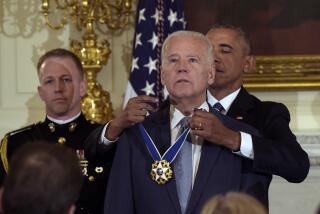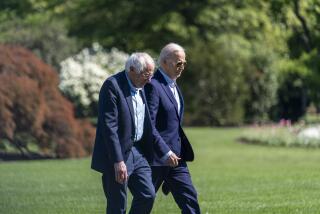Wary, Weary Clinton Sifts Various Views : Democrats: He retains helm of his campaign as advisers compete for his attention with agendas that often conflict.
- Share via
WASHINGTON — Earlier this month, just minutes before an hourlong appearance on CNN’s Larry King show, Bill Clinton stood in the kitchen of the governor’s mansion in Little Rock, Ark., as all around him, gesticulating and shouting, top aides offered conflicting advice about what he should say if asked about a constitutional amendment to balance the federal budget.
That night, President Bush had used a prime-time news conference to tout the amendment. Some Clinton advisers argued that the presumed Democratic presidential nominee should take Bush on directly, appealing to core Democratic constituencies that might feel threatened by the program cuts the amendment would bring.
But others said Clinton should not cede the fiscal responsibility issue and should challenge Congress to work to bring federal spending under control.
What happened next could stand as a metaphor for the difficulties Clinton has faced in shifting from a campaign to capture the nomination to one focused on winning in November.
After the few hectic minutes of discussion, Clinton went on the air. And, as he often does, he sought to meld differing views. Asked by King about the amendment in the show’s opening moment, he stopped short of flatly opposing it. “The way the amendment is worded, I have real problems with it,” he said.
Then, in an eye-glazing 602-word recitation, Clinton proceeded to tout his support for a presidential line-item veto of budget measures--something the Republicans also have called for--mentioned his own success in balancing budgets in Arkansas, criticized Bush for not submitting balanced budgets of his own, recapped his proposals for increasing taxes on wealthy Americans and called for increasing the portion of the budget that goes for investment in future technology.
It was not, top aides conceded, his finest performance.
Clinton may be forgiven if at times of late he has seemed both wary and weary. Behind the scenes in Little Rock, he has been pummeled with conflicting advice on everything from fundamental strategy to campaign structure.
Move left. Move right. Talk specifics. Don’t sound like such a policy nerd. Try to solidify the Democratic base. Reach beyond the base to the disaffected middle class. Take on Bush. Take on prospective presidential foe Ross Perot. Take on Congress. Reach agreements with Congress.
The problems could be worse. Divisions within the Clinton camp seem tame compared with the back-biting, despondency and gloom gripping many in the White House and Bush campaign offices. Nonetheless, the last few weeks have forced Clinton to confront tough decisions that could determine his chances of winning the presidency and shed considerable light on what sort of White House he might run if he got there.
Some of the decisions involve campaign structure, a matter that may seem obscure but often provide the best clues to how a candidate behaves in office.
In Bush’s case, for example, the structure of his Administration closely resembles that of his 1988 campaign--a tightly run organization with nearly all key decisions made by a small group of advisers, many of whom the President has known for years.
Clinton has created a campaign structure in which several top aides each exercise considerable sway over separate segments of the operation but in which no one strongman fills the role of the undisputed campaign boss.
The structure reflects Clinton’s insistence on serving as his own chief political operative, as well as his preference for a relatively open management system in which several aides report to him rather than through a powerful staff chief.
In building his current structure, Clinton has had to make difficult choices involving friends and advisers.
Recently, for example, Susan Thomases, a New York attorney who plans to move to Little Rock later this year in the unprecedented role of overseeing the campaign efforts of Clinton’s wife, Hillary, objected to elements of a $200,000 polling project prepared by Clinton pollster Stanley Greenberg.
Many within the campaign interpreted Thomases’ bid to influence the project as a challenge to George Stephanopoulos, the 31-year-old former aide to House Majority Leader Richard A. Gephardt (D-Mo.) who serves as Clinton’s communications director. Campaign Chairman Mickey Kantor insisted in an interview that such an interpretation was overblown. Stephanopoulos declined to comment and Thomases could not be reached.
In the end, Clinton resolved the dispute by reaffirming the structure in which Stephanopoulos, campaign manager David Wilhelm and campaign chief of staff Eli J. Segal each have authority to make decisions within their spheres.
The past weeks also have been marked by lengthy discussions of central strategic questions, such as whether Clinton should emphasize an appeal to the Democratic base--liberals, blacks, union members, city dwellers--or whether he should continue his original campaign plan of trying to weave together a coalition including large numbers of white suburban voters.
Clinton began his campaign rejecting the idea that a Democrat could win the presidency simply by finding ways to increase turnout among the party’s core members. But Perot’s rise led some Clinton aides to renew that debate. They argued that if Bush and Perot split the Republican and independent vote, Clinton could win with a high Democratic turnout.
Clinton and most of his advisers seem to have reaffirmed their original position, in part because they believe that some time in October, one of the three presidential candidates will begin to fade and the race will become essentially a two-person contest in which broad support is needed to win.
The campaign also has had to find new ways of presenting Clinton’s basic theme in light of Perot’s surge. Clinton hoped to present himself as an outsider, an agent of political change. But Perot has made that far more difficult, perhaps impossible.
As a result, while Clinton still talks of change, he now stresses the idea of effectiveness--the notion that only he actually would be able to bring about the changes the country needs.
More to Read
Get the L.A. Times Politics newsletter
Deeply reported insights into legislation, politics and policy from Sacramento, Washington and beyond. In your inbox twice per week.
You may occasionally receive promotional content from the Los Angeles Times.










